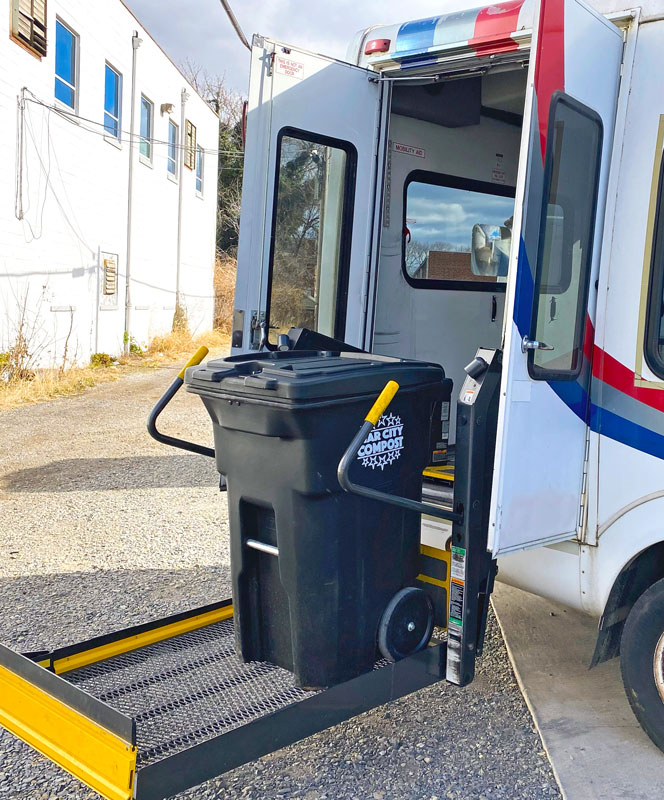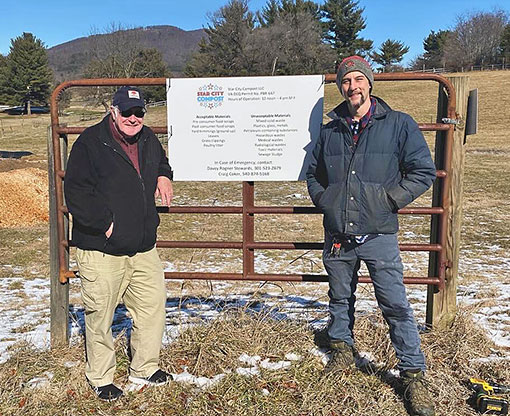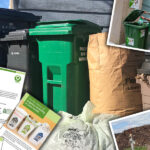Top: Davey Stewards of Star City Compost collecting household food waste. Photos courtesy of Star City Compost.
A new food scraps composting facility opened its doors in early January, receiving its first load of material from 23 curbside households and 50 drop-off customers in Roanoke, Virginia. Star City Compost provides collection of residential and commercial/institutional food scraps and set up several drop-off locations to service households. Composting is done in aerated bunkers on less than 2 acres of a 12-acre property owned by the Roanoke Natural Foods Co-Op. “Roanoke Co-op bought the property, which originally housed the City of Roanoke Police horse barns,” explains Davey Stewards, who founded Star City Compost with Craig Coker, owner of Coker Composting and Consulting and long-time BioCycle Senior Editor who is based in Roanoke. “The Co-op bought the land to start a farm but stopped farming in 2015. I operated a community garden on the property for three years and made compost from food scraps and wood chips to use in the garden. In 2019, I got the idea to lease the site from the Co-op and open a composting facility. I met with staff at the Virginia Department of Environmental Quality (DEQ) about starting a facility, and realized I was in over my head — in large part because the DEQ requires a licensed solid waste facility operator. The person at DEQ suggested I get in touch with Craig, who has that certification. I reached out and Craig became a partner in Star City Compost.”
The property is in an industrial park and had to be approved under a “special exception” zoning determination, which took about 1.5 years. Star City Compost has a permit-by-rule from Virginia DEQ and is permitted to receive 1,700 tons/year of all feedstocks. The state requires funds be reserved for site closure costs. “The annual fee for holding a trust fund [for site closure] with our bank is $2,500,” says Stewards. “This was the only way we could satisfy financial assurance and it is a steep fee for a small facility like ours.” Adds Coker: “With the trend to building smaller, decentralized composting facilities, the DEQ should consider having this closure cost based on facility scale.”
Star City’s composting facility has a bunker for food waste receiving and blending, and then five 960-cubic foot open-air bunkers made of concrete blocks, with a concrete floor. Aeration pipes sit on top of the floor; each bunker has its own fan. The bunker doors are made from recycled ice hockey rink panels. They are double doors (bottom and top set) so that material can be added by opening the top set of doors as the pile inside gets higher. “Retention time in the aerated bunkers is 30 days,” notes Coker. “There is a drain in the back and on one side of the bunker floors to capture leachate, which flows down hill to three 275-gallon IBC totes to collect it. The leachate can be pumped back to the bunkers for moisture addition to the active composting piles.”
After 30 days in the bunker, material is moved to an adjacent flat field and put in a windrow for a week, where it is turned several times with a bucket loader. Then it is moved to a mass bed where it cures for 60 to 90 days. Finished compost will be screened and Star City Compost is looking into purchasing used bagging equipment to be able to sell the compost in bags and bulk. Total costs to build the facility were $80,000.
All types of food waste are accepted, along with food-soiled paper and pizza boxes. Tree trimmers and arborists drop off chipped wood that is used as amendment. Residents and commercial clients are given BPI-certified compostable liner bags for the collection containers. Households pay $30 for a 5-gallon curbside bucket with a twist-off lid; weekly curbside collection service is $25/month. Curbside collection is limited to certain neighborhoods in Roanoke initially, to help build route density. The fee is $10/month to use the food scraps drop-off alternative. Two collection carts are inside a shed that can be accessed using the code for the combination lock. There is a drop-off shed at the composting facility and a second site at a local food hub. Several more are being established.

A retrofitted 16-foot transport bus equipped with a wheelchair lift is used to service the commercial collection routes.
Commercial and institutional accounts are serviced with 32- and 64-gallon totes. Collection is offered on a weekly or twice/week schedule for commercial clients including restaurants, cafeterias, schools, grocery stores, and apartment complexes. The starting fee is $16 for a 32-gallon tote serviced once a week. Stewards uses a retrofitted 16-foot transport bus equipped with a wheelchair lift for the commercial collection routes. “The bus was donated and has over 200,000 miles on it,” he says. “The wheelchair lift is used to load and unload the carts, which are strapped in. There is capacity for 11 totes in the bus. I use a pickup truck to service the residential routes. There are 20-gallon totes in the truck bed. I weigh the pails, and empty them into the carts, give the pail a wipe and provide a new liner.”
The City of Roanoke does not offer any curbside organics collection. Residents pay a flat fee of $16/month for solid waste services. Collected waste is taken to a transfer station and then hauled to a landfill. “The city landfilled 271,000 tons of waste in 2023,” says Coker. “I estimate that 60,000 to 65,000 tons of that is food waste, contributing to our area’s greenhouse gas emissions. A big part of why Davey and I started Star City Compost is to build awareness of composting and its benefits, not just for the climate but also to improve local soils.”
















